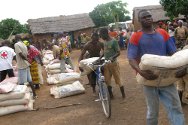The ICRC regional delegation in Côte d'Ivoire
16-07-2012 Overview
The ICRC delegation in Abidjan covers Côte d'Ivoire, Benin, Burkina Faso, Ghana and Togo. It helps displaced persons in Côte d'Ivoire and Malian refugees in Burkina Faso. In all the countries covered, the ICRC visits places of detention and helps the authorities to foster compliance with international humanitarian law.
Background
The ICRC first started working in Côte d’Ivoire in 1989. Since 1992, the regional delegation in Abidjan has extended its operations to include Ghana, Togo, Benin and Burkina Faso. In Côte d'Ivoire, the ICRC also has offices in Gagnoa, Man and Guiglo.
Humanitarian situation in Burkina Faso
Over 60,000 Malian refugees have arrived in the provinces of Oudalan and Soum, in the Sahel. This influx has exacerbated difficult living conditions in this area, which is subject to desertification.
The Burkinabé Red Cross Society is helping people living in refugee camps. In February, the ICRC and the Burkinabé Red Cross distributed essential household supplies to refugee families.
Post-electoral crisis in Côte d'Ivoire
After the second round of presidential elections on 28 November 2010, violence quickly broke out in Abidjan and elsewhere in the country, escalating into armed conflict. Although the fighting has ended, there are still major humanitarian needs.
Since the crisis began, the ICRC has been focusing its efforts in the west of the country. It keeps a close eye on the unfolding situation, particularly as regards the return of those who fled, the impact of intercommunal clashes, conditions of detention, and ongoing election-related incidents.
Supporting communities stricken by conflict
The ICRC disinfects wells and distributes water, food and household items to people who have fled their homes. It also supplies rural communities with the means to grow their own food. To help the Ivorian government provide basic water and health services, the ICRC is supporting national water board and health centres in areas at risk. Where there are no health facilities, the ICRC and the Red Cross Society of Côte d'Ivoire set up mobile clinics for those worst-hit by the crisis.
Restoring family links
As a result of the conflict, hundreds of families ended up scattered and living with the anguish of not knowing what had become of their relatives. Many Ivorians sought refuge in neighbouring countries. The ICRC, in conjunction with the Red Cross Societies of Guinea, Ghana and Liberia, therefore set out to locate these people and helped them to get back in touch with their families. Some, particularly unaccompanied children, were reunited with their families. This is an ongoing process.
Helping detainees
ICRC delegates visit detainees in Côte d'Ivoire, Benin, Burkina Faso and Togo and communicate their findings and recommendations in confidence to the authorities. Where necessary, it works with them to improve the detainees' living conditions and treatment. Depending on the urgency of their needs, the ICRC might distribute food and hygiene items, or take action to ensure that they have access to health care. It also helps to refurbish some prison facilities, in particular kitchens and sanitary facilities.
Promoting international humanitarian law
The ICRC supports the national authorities' efforts to foster compliance with international humanitarian law (IHL). It encourages the armed and security forces and armed groups to comply with IHL and other applicable provisions. The ICRC shares with the authorities its findings about how security forces conduct their operations. It also reminds them of the importance of respecting the fundamental rights of civilians.
Engaging in dialogue with weapon-bearers
Given the latent political and intercommunal tensions in some countries in the region, the ICRC has stepped up its dialogue with the local and national authorities, with armed groups and with influential members of society and the media. The purpose of this dialogue is to raise awareness and foster understanding of, and compliance with, humanitarian law. These efforts are key to guaranteeing the safety of ICRC and National Society staff as they come to the aid of people affected by violence.
Supporting National Societies
The ICRC strives to boost the operational capacity of the National Societies in the region by providing structural, financial, material and logistical support in addition to training and advice.
